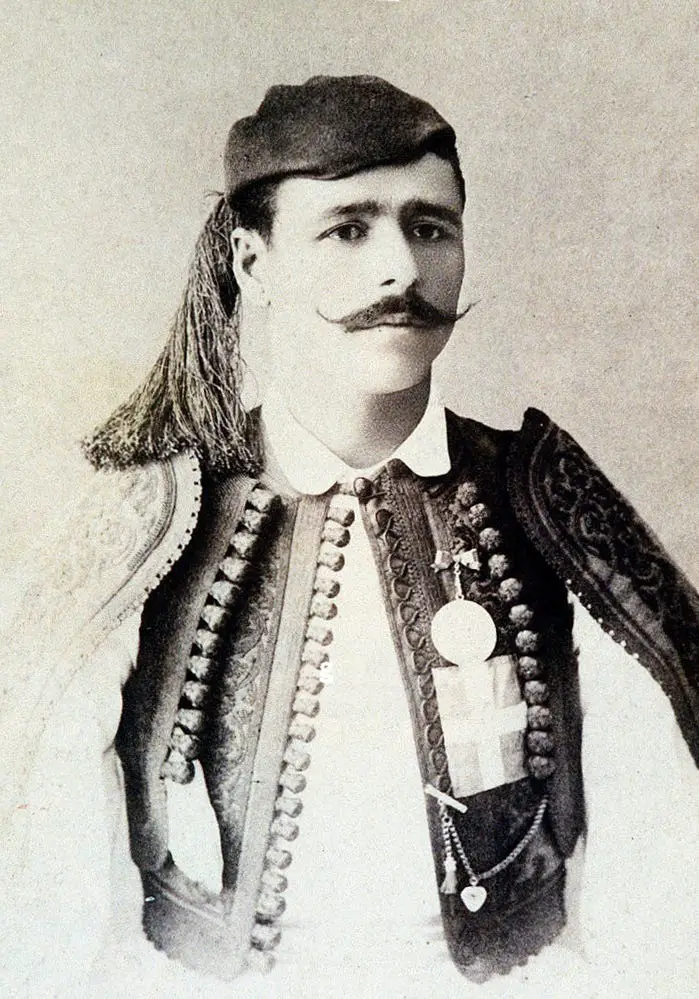
The marathon originated from the legend of Pheidippides. In 490 BC, after running the distance from Marathon to Athens with news the Greeks had defeated the Persians at the Battle of Marathon, Pheidippides collapsed and then died. When the first modern marathon took place to commemorate this event at the 1896 Olympic Games, a very unlikely runner managed to take first prize.
The Greeks very much wanted to win the first Olympic marathon at the 1896 games, and they held two selection races within a month of the Olympic race to determine who would give them the best chance. The first Greek selection race was held on February 27, 1896. The top six finishers got a place on the Greek Olympic team. Two weeks later, on March 12, 1896, another race was held, and the top six finishers of this race were also selected to be a part of the team. The fifth-place finisher in this particular race had only declared his entry to run a few hours before the race was to start. His name was Spyridon Louis.
Spyridon Louis was a Greek shepherd and former soldier with no athletic training in running this race’s distance. But his job was physical as he had to transport fresh water to Athens in barrels, running along with the horse-drawn cart for a distance of about 14 kilometers. Other than having a job that required incredible endurance, Louis had no running competition experience.
The athletes arrived in the village of Marathon a day before the marathon was to take place. There were 17 total entries. Thirteen men were from Greece, and there was one runner each from Australia, France, Hungary, and the United States. The race began on April 10, 1896, in the afternoon, and the day was cool and sunny.
The foreign runners immediately took the lead. The French runner, Albin Lermusiaux, pulled out to a quick start over the others. The closest Greek runners behind the foreigners were the two Olympic trial winners, but they had to drop out about halfway through the race.
Louis was running with another Greek athlete and eventually saw the foreign runners. As legend had it, Louis stopped at a roadside inn, downed a glass of wine, and questioned the spectators about who was in front of him before declaring that he was going to win. Louis’s grandson later disputed this event and said that Louis’s girlfriend gave him an orange and a glass of cognac later in the race along the side of the course.
After the race’s hilly segment began, it soon started to take its toll on the runners. The Frenchman (who ended up dropping out at this point and took a carriage to the finish line), as well as some of the other leaders, began to fall behind. The Australian, Edwin Flack, took the lead, but Louis started to close in on him.
During the downhill section, Flack bowed out, and he too opted for a carriage ride to the finish. Louis entered the city limits of Athens in the lead in the Olympic marathon after about 20 miles of running. The crowd at the stadium had no idea that a Greek was in first place, thinking instead that the Australian, Flack, was the leader. But news soon filtered in that Louis would be entering the stadium first. The crowd erupted as Louis rounded the stadium, and he was soon accompanied by the crown prince of Greece and his brother as they ran with him as he crossed the finish line.
Louis finished in 2 hours, 58 minutes, and 50 seconds, seven minutes faster than the next runner. Not bad for a guy that never trained to run a marathon. In the 2019 New York Marathon, just to put things into perspective, the fastest runner finished the course in a time of 2 hours, 8 minutes, and 13 seconds.
Spiridon Louis never ran another race after that one and returned to his previous life, but he became a national hero. He even had the Olympic Stadium of Athens named after him for the 2004 Athens Olympics.
One More Fun Fact
A silver cup was awarded to Louis for his marathon victory in 1896. It went up for auction in 2012 at Christie’s in London and sold for $860,000 (£541,250). The buyer was the Stavros Niarchos Foundation in Greece. It is currently displayed at the Stavros Niarchos Foundation Cultural Center in Athens. The purchase broke all auction records for Olympic memorabilia.


